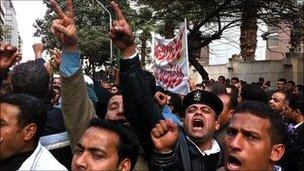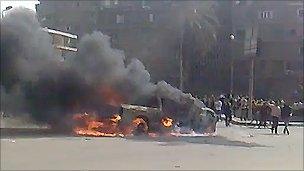Hated Egyptian police try to win public trust
- Published

Police officers are now themselves demanding reforms at the interior ministry
As Egypt's despised security agencies return to duty, the BBC's Yolande Knell looks at their uphill struggle to win back public trust.
In the video he shot on his mobile phone, Ehab el-Sawy softly calls out the name of his dead brother, Mustafa, as he examines his body in the hospital morgue.
He lifts a blood-stained shirt to show his neck and chest covered in bullet wounds.
"The security forces were on Qasr al-Nil bridge. They started using excessive force and firing," says Ehab, who was with his brother when he was shot during demonstrations in central Cairo on 28 January. "Mustafa was hit at close-range."
The footage of the dead 25-year-old has been handed to Egypt's public prosecutor who is investigating the case.
'Dead consciences'
Last week it was announced that the former interior minister, Habib el-Adly, and the heads of his three security agencies would face trial for killing demonstrators.
Now many victims' families want individual officers to face charges too.
"We saw police officers with dead consciences. They fired on people without even a brick in their hands. We want whoever did this to be held accountable," says Ehab.
Egypt's interior ministry forces have long had a reputation for corruption and brutality.
Public fear and hatred of them only increased as they tried to suppress mass demonstrations.
Human rights groups now calculate that 685 people were killed in violent clashes between 28 January and 3 February.
There was also anger as police abandoned their duties and prison guards released thousands of inmates from jail. Householders were left to guard their own properties.
Following a rise in crime, the new Prime Minister, Essam Sharaf, ordered police to return to the streets earlier this month.
The country's new military rulers have made reforms, most notably disbanding the State Security Investigations Agency, used to spy on citizens and crush political opposition.
Yet some rights campaigners are wary.
"As yet we don't know what the mandate will be for the new National Security Agency taking over from State Security Investigations, or how it will differ," says Heba Morayef of Human Rights Watch.
"We need more reassurances that reforms will result in changes in policy and the impunity which allowed the interior ministry to torture and make people 'disappear' over the years. We would like to see judicial oversight."
Police makeover
Already some changes in style and approach can be detected.
Several years of living and working in Egypt taught me to be wary of the security services.
Encounters generally resulted in threats, intimidation or obstruction to my work as a journalist.
It was a surprise then to be invited to the police headquarters in the Cairo district of Agouza in a friendly manner.

A police officer's car was on fire in Maadi
I was shown to the office of Capt Mamdouh Abu Tulib, who told me he was responsible for public relations at the police station and agreed to an interview.
"Thank God, we are operating back on our full capacity following the end of the uprising," he said.
"We had a lot of crimes - burglaries, hate crimes, gangs - but all of this is now being contained."
"The police will not be like they were before 25 January. There is a level of trust now."
But there are many anecdotes and reports currently circulating in Egypt that show there is still a long way to go.
Last month, crowds ganged up on a police officer in Maadi, a wealthy suburb of the capital, after he shot a microbus driver in a dispute at a busy roundabout.
"They saw his ID, then someone shouted, 'he's a policeman'," says Sayid, caretaker of a nearby building. "I saw everyone hitting him.
"They beat him badly until the army came and took him. Then people set his truck on fire."
Such scenes of lawlessness trouble ordinary Egyptians seeking stability.
"Even though they're dirty and corrupt, we need the police 100% at this time," says Sayid.
"I don't feel safe. There aren't police in Maadi like before. They need to return but they're afraid of us," adds a local woman. "They feel ashamed."
Strange twist
In a strange twist, the police who tried to prevent popular protests have now begun organising rallies themselves.
Hundreds of angry officers gathered outside the interior ministry last week.
I met one group of officers who had recently been suspended or dismissed and wanted their jobs back.
Others' demands included greater freedom of expression, a more transparent promotions system, and, like many low-paid Egyptian public workers, better wages.
"I am old. I have stayed in the police for 27 years but I get paid 1,000 Egyptian pounds ($168) a month. How can anyone live in this country?" said a transport police officer.
"Now we are not allowed to take money because this is corruption. My job is much more difficult."
The coming months of transition will be a key period for policy-makers to tackle such issues.
Free and fair elections and a handover to civilian rule are due late this year.
For a new Egypt to emerge, a new police force is desperately needed.
- Published23 March 2011
- Published8 March 2011
- Published9 March 2011